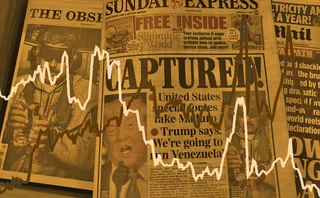
How FVA saved the cross-currency swap
Funding benefits have slashed pricing for some uncollateralised trades

If you want to understand the impact of funding costs and benefits on derivatives pricing, the place to look is the cross-currency swap market, where increasingly fierce competition among dealers has been accompanied by the widespread adoption of the funding valuation adjustment (FVA).
Looked at purely in terms of bank capital, the cross-currency swap is bordering on toxic. In its classic application – to transform a bond issue from one currency to another – it is popular with corporate treasurers, meaning trades tend to be long-dated, chunky and uncollateralised. The counterparty exposure does not wind down during the life of the products, because there is an exchange of principal at maturity. Those features are penalised by Basel III.
Speaking to dealers and their clients in mid-2012, it looked like the writing was on the wall. One European bank that shared its pricing with Risk at the time claimed the cost – in basis points running – would more than triple, from 5.2bp to 18bp, for an A-rated corporate to execute a $100 million notional euro/US dollar cross-currency swap. Treasurers said they were using the product less – and worried they might have to stop altogether – while senior traders predicted "a renationalisation of markets".
The answer appeared both obvious and implausible – corporates should collateralise. The rise of FVA has inverted that argument in some cases.
Where a dealer is out-of-the-money on an uncollateralised trade with a client, it will not have to post margin, but will be receiving cash from the collateralised hedge – which can be on-lent to the bank's treasury. The funding benefit adjustment (FBA) this creates can be significant in some cases; imagine a trade in which a dealer expects to be out-of-the-money for much of its life, has higher-than-average funding costs and is facing a highly rated customer. In these situations, dealers say, FBA can wipe out the implied capital costs.
It wasn't until 2014 that most dealers revalued their derivatives books to incorporate these effects. Today, uncollateralised cross-currency swaps have become less problematic, and the market for them more competitive.
It's difficult to feel entirely comfortable about this. Ultimately, banks are arguing that they are, in some cases, better off facing uncollateralised counterparties. That stops being true when the counterparty defaults, of course. It also raises questions about the size of the FBA dealers are calculating – and this remains an inexact science.
As competition for lucrative corporate business grows, there is a danger banks will go too far. There were worrying signs of this last year, as our lead story describes, with many traders claiming their rivals are starting to give discounts based on the bank's own default risk – a practice with which many remain profoundly uncomfortable.
Only users who have a paid subscription or are part of a corporate subscription are able to print or copy content.
To access these options, along with all other subscription benefits, please contact info@risk.net or view our subscription options here: http://subscriptions.risk.net/subscribe
You are currently unable to print this content. Please contact info@risk.net to find out more.
You are currently unable to copy this content. Please contact info@risk.net to find out more.
Copyright Infopro Digital Limited. All rights reserved.
As outlined in our terms and conditions, https://www.infopro-digital.com/terms-and-conditions/subscriptions/ (point 2.4), printing is limited to a single copy.
If you would like to purchase additional rights please email info@risk.net
Copyright Infopro Digital Limited. All rights reserved.
You may share this content using our article tools. As outlined in our terms and conditions, https://www.infopro-digital.com/terms-and-conditions/subscriptions/ (clause 2.4), an Authorised User may only make one copy of the materials for their own personal use. You must also comply with the restrictions in clause 2.5.
If you would like to purchase additional rights please email info@risk.net
More on Markets
How JPM AM swapped platforms for pipes
Asset manager wanted to cut FX venues – and their fees – out of dealer relationships. Now, it only trades direct
Keeping inflation markets open if government shuts down
Last year’s US government shutdown upset inflation trades; an Isda band-aid helped but a longer-term fix is needed
Brokers must shift HFT servers after China colocation ban
New exchange guidance drives rush for “proximity colo” in nearby data centres
LatAm FX carry trade shrugs off geopolitical fears
Clients in regional carry positions remain undeterred by US interventions, say dealers
S&P bull run drives interest in reset and lookback hedges
Variable strike put options proved popular alternative hedging format of 2025
US mutual funds slash short euro positions at record pace
Counterparty Radar: Pimco cut $4.6bn of EUR/USD puts in Q3 amid changing stance on dollar direction
Nomura hires new global eFX head
Mark McMillan to oversee e-trading and sales activities in newly created role
Trump’s LatAm gambit spurs FX hedging rush
Venezuela op boosts risk reversals as investors look to protect carry trades








